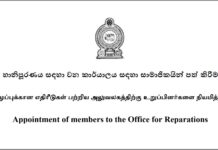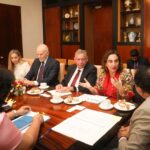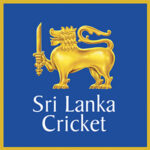Kathmandu, 8 September 2021 – The World Health Organization yesterday, September 8, urged countries in South-East Asia Region to enhance routine immunization along with the ongoing efforts to rapidly increase COVID-19 vaccination coverage.
“The vulnerability to vaccine preventable diseases has increased with the pandemic disrupting essential immunization services and surveillance for vaccine preventable disease. Though efforts are being made, much more needs to be done specially at the sub-national levels and to reach the unreached and underserved population,” said Dr. Poonam Khetrapal Singh, Regional Director, WHO South-East Asia, at the Seventy-Fourth Regional Committee meeting.
Recalling the strong progress made until the onset of the pandemic, the Regional Director said, by 2019 the Region was in a historically best position related to vaccine preventable disease control with 91% coverage with three doses of DTP vaccine (DTP3). Ten of 11 countries had achieved more than 90% DTP3 coverage.
Though routine immunization services were among the first essential services that countries began to restore during the pandemic, the DTP3 coverage in the Region dipped to 85% in 2020. The number of unvaccinated or partially vaccinated children increased to 4.9 million as against 3 million in 2019. Surveillance of vaccine preventable diseases was also affected.
The COVID-19 pandemic has also impacted implementation of strategies for measles and rubella elimination, a flagship priority in the Region. The estimated coverage with the first dose of measles-containing vaccine (MCV1) in the Region declined to 88% in 2020 compared with 94% in 2019.
Similarly, coverage with the second dose of measles-containing vaccine declined to 78% in 2020 compared with 83% in 2019. The COVID-19 pandemic has also resulted in surveillance gaps in several countries and has delayed implementation of mass vaccination campaigns and other immunization-related activities.
“There is an urgent need to repair the damage caused by COVID-19, to regain the momentum achieved in the previous decade, and to protect infants, young people and adults with life-saving vaccines,” Dr. Khetrapal Singh said.
The ongoing Regional Committee meeting discussed the Strategic Framework for the South-East Asia Regional Vaccine Action Plan 2022−2030 which focuses on the roll-out of COVID-19 vaccination and restoration of immunization systems and vaccine-preventable disease surveillance from the impact of the COVID-19 pandemic.
“We need to ensure strategies are in place to maintain and enhance routine immunization without impacting the efforts to increase COVID-19 vaccination rates, the Regional Director said. Adequate human resources for routine immunization and COVID-19 vaccination, efforts to build confidence among people to access immunization services and having Standard Operating Procedures in place for enhancing immunization activities immediately following cessation of lockdown periods, are some of the critical measures that need to be taken,” she also said.
“Implementation of the framework will need high-level political and programmatic commitment and partner collaboration to which WHO is committed,” the Regional Director said.
Countries in the Region are making unprecedented efforts to expand COVID-19 vaccination coverage with over 915 million doses administered across the Region. The availability of more vaccine doses in recent weeks has helped scale up coverage.
Despite the challenges posed by the pandemic, the Region has maintained its status of having eradicated polio and eliminated maternal and neonatal tetanus. Measles elimination has been achieved and maintained in five countries, while two of these countries have also achieved rubella elimination. Four countries have been verified as having achieved hepatitis B control through immunization.
The Regional Committee meeting is the annual governing body meeting of WHO South-East Asia Region. Being hosted by Nepal, the meeting is being held virtually for the second consecutive year in view of the pandemic.












